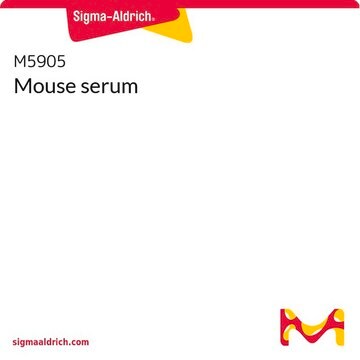MAB8661
Anti-Influenza B Antibody, nucleoprotein, clones B2, B4 Blend
ascites fluid, Chemicon®, from mouse
Sign Into View Organizational & Contract Pricing
All Photos(1)
About This Item
UNSPSC Code:
12352203
eCl@ss:
32160702
NACRES:
NA.41
Recommended Products
biological source
mouse
Quality Level
antibody form
ascites fluid
antibody product type
primary antibodies
clone
B2, monoclonal
B4, monoclonal
species reactivity
human
manufacturer/tradename
Chemicon®
technique(s)
immunofluorescence: suitable
isotype
IgG
shipped in
wet ice
Specificity
Recognizes all subtypes of Influenza B. Blend of two clones that recognize the nucleoprotein antigen.
No cross-reactivity to influenza A, parainfluenza 1, 2 or 3, adenovirus or RSV.
No cross-reactivity to influenza A, parainfluenza 1, 2 or 3, adenovirus or RSV.
Immunogen
Influenza Blend.
Application
Anti-Influenza B Antibody, nucleoprotein, clones B2, B4 Blend detects level of Influenza B & has been published & validated for use in IF.
Indirect immunofluorescence at 1:100.
Final working dilutions must be determined by end user.
Final working dilutions must be determined by end user.
Research Category
Infectious Diseases
Infectious Diseases
Research Sub Category
Infectious Diseases - Viral
Infectious Diseases - Viral
Physical form
Ascites fluid with 0.1% sodium azide as a preservative.
Unpurified
Storage and Stability
Maintain for 1 year at -20°C from date of shipment. Aliquot to avoid repeated freezing and thawing. For maximum recovery of product, centrifuge the original vial after thawing and prior to removing the cap.
Analysis Note
Control
Influenza Control Slides, Catalogue Number 5010-5
Influenza Control Slides, Catalogue Number 5010-5
Other Notes
Concentration: Please refer to the Certificate of Analysis for the lot-specific concentration.
Legal Information
CHEMICON is a registered trademark of Merck KGaA, Darmstadt, Germany
Disclaimer
Unless otherwise stated in our catalog or other company documentation accompanying the product(s), our products are intended for research use only and are not to be used for any other purpose, which includes but is not limited to, unauthorized commercial uses, in vitro diagnostic uses, ex vivo or in vivo therapeutic uses or any type of consumption or application to humans or animals.
Not finding the right product?
Try our Product Selector Tool.
Storage Class Code
12 - Non Combustible Liquids
WGK
nwg
Flash Point(F)
Not applicable
Flash Point(C)
Not applicable
Certificates of Analysis (COA)
Search for Certificates of Analysis (COA) by entering the products Lot/Batch Number. Lot and Batch Numbers can be found on a product’s label following the words ‘Lot’ or ‘Batch’.
Already Own This Product?
Find documentation for the products that you have recently purchased in the Document Library.
Tina Schmidt et al.
European journal of immunology, 42(7), 1755-1766 (2012-05-16)
Antigen-specific antibodies are well characterized after vaccination with pandemic H1N1 or seasonal influenza vaccines. However, knowledge on cellular immunity toward pandemic H1N1 after vaccination and infection and cross-reactivities toward seasonal antigens is limited. Nineteen individuals were vaccinated with the pandemic
Holly C Simmons et al.
PLoS biology, 21(12), e3002415-e3002415 (2023-12-21)
Antibody titers that inhibit the influenza virus hemagglutinin (HA) from engaging its receptor are the accepted correlate of protection from infection. Many potent antibodies with broad, intra-subtype specificity bind HA at the receptor binding site (RBS). One barrier to broad
Genetic variability of human metapneumovirus isolated from Chilean children, 2003-2004.
Carola Escobar,Vivian Luchsinger,Danielle Bruna de Oliveira,Edison Durigon et al.
Journal of Medical Virology null
Ching-Ping Tsai et al.
Influenza and other respiratory viruses, 13(1), 91-105 (2018-07-12)
Influenza B viruses (IBVs) have never been isolated from natural-infected pigs in clinical cases, although the susceptibility of domestic pigs to experimental IBV infections had been confirmed as well as IBV-specific antibodies were detected from pigs under natural and experimental
Kevin R McCarthy et al.
Proceedings of the National Academy of Sciences of the United States of America, 118(23) (2021-06-03)
Immune memory of a first infection with influenza virus establishes a lasting imprint. Recall of that memory dominates the response to later infections or vaccinations by antigenically drifted strains. Early childhood immunization before infection may leave an imprint with different
Our team of scientists has experience in all areas of research including Life Science, Material Science, Chemical Synthesis, Chromatography, Analytical and many others.
Contact Technical Service





